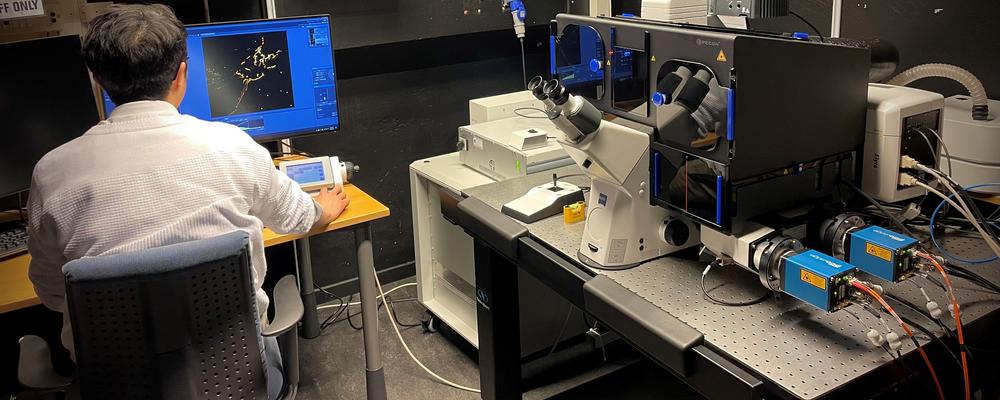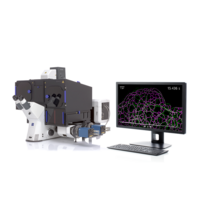
ELYRA 7 with Lattice SIM and SMLM
The Carl Zeiss ELYRA7 is a state-of-the-art inverted widefield microscope designed for fast (Super-resolution) live-cell imaging via Lattice Structured Illumination Microscopy (SIM) and single-molecule localization microscopy (SMLM).
The Elyra 7 microscope
The ELYRA 7 microscope is a widefield inverted microscope designed for high-speed super-resolution imaging of biological specimens with minimal light exposure. It is equipped with an incubation system (temperature and CO2 control) and a dual camera adapter that houses two sCMOS cameras (PCO edge) for imaging two channels simultaneously.
The ELYRA7 is capable of out-of-focus light suppression and sectioning via the Apotome module and doubling the resolution of conventional widefield via Lattice Structured Illumination Microscopy (SIM). Novel image processing and imaging modalities like Burst and Leap modes can be used for increased speed and efficiency during imaging. Further, the ELYRA7 also allows for Single Molecule Localization Microscopy (SMLM) techniques such as PALM, dSTORM, and PAINT. SMLM is available with high-power lasers across the visible spectrum giving access to a broad range of fluorescent markers.


Imaging modalities of the ELYRA 7



Elyra 7 system characteristics
Objective lenses
Air objectives (Apotome)
- EC Plan-Neofluar 10X / 0.3 external link
- Plan-Apochromat 20X / 0.8 external link
Immersion objectives (SIM, SMLM)
- C-Apochromat 63X /1.2 Water external link
- Plan-Apochromat 63X / 1.4 Oil external link
- alpha Plan-Apochromat 63X / 1.46 Oil external link
Light sources
Lasers
- HR Diode 405 nm 50 mW
- HR Diode 488 nm 500 mW
- HR Diode 561 nm 500 mW
- HR Diode 642 nm 500 mW
Fluorescent Lamp
- HXP fluorescent lamp
Note: Elyra 7 is capable of TIRF illumination for laser widefield and SMLM
Filters
Reflector module:
Filterset 1: Flexible
- LBF 405/488/561/642 (QUAD)
- Excitation 405/488/642 Emission BP 420-480 + BP 495-550 + LP 655
- Excitation 488/561 Emission BP 495-550 + BP 570-620
- Excitation 405/642 Emission BP 420-480 + LP 655
Filterset 2: Pure
- LBF 405/488/561/642 (QUAD)
- Excitation 405 Emission BP 420-480
- Excitation 488 Emission EF BP 495-590
- Excitation 561 Emission EF LP 570
Duolink:
- SR Quad: Position 1 LP 560 | Position 2 BP 490-560 + LP 640
- SR DUO: Position 1 LP 560 | Position 2 LP 640
Cameras
Duolink adapter to operate two sCMOS cameras:
- pco.edge 4.2 CL HS sCMOS camera, 6.5 µm pixel size, peak QE 82%, liquid cooled